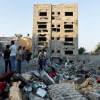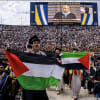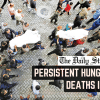Weaponising hunger: An anatomy of Israel’s war crime

The deliberate deprivation of food in Gaza is not merely a humanitarian tragedy; it is a premeditated assault of genocidal war, with far-reaching legal, ethical, and geopolitical ramifications. In the aftermath of the October 7, 2023, attacks by Hamas, Israel's military campaign has turned food into a weapon of control and subjugation. This calculated starvation policy signals a cruelty that thrives on the systematic erosion of human dignity, relentless dehumanisation, and is compounded by moral turpitude. As civilians bear the heaviest brunt, food becomes a lever of domination.
A key colonial parallel to the weaponisation of food in Gaza is found in two major imperial campaigns: the Maji Maji Rebellion (1905–1907) in East Africa and the Bengal Famine of 1943 under British rule. In the former, German forces responded to anti-colonial resistance by deliberately destroying crops and inducing famine, leading to the deaths of up to 300,000 civilians. Similarly, during the Bengal Famine, Winston Churchill's wartime cabinet diverted food supplies away from India, prioritising the British war effort and rejecting pleas for relief. The result was the starvation of around three million Bangalees—a famine now widely seen as driven by colonial indifference and racialised policy. Both cases reveal how colonial powers weaponised food as a means of control, with devastating consequences for colonised civilians—parallels that echo in today's siege of Gaza.
Since the onset of the conflict, the Israeli government has imposed a near-total blockade on Gaza, cutting off essential supplies, including food, fuel, and water. The closure of border crossings, stringent inspection protocols, and deliberate delays have left humanitarian convoys stranded or severely restricted. While Israel maintains that these measures are aimed at weakening Hamas, the consequences for the 2.3 million civilians trapped in Gaza have been catastrophic.
The Integrated Food Security Phase Classification (IPC) reported in March 2024 that northern Gaza had reached IPC Phase 5: Catastrophe. This is the highest level of food insecurity, indicating that households face an extreme lack of food, resulting in starvation, death, and destitution. UN agencies, including the World Food Programme (WFP) and the UN Relief and Works Agency (UNRWA), have confirmed that Gaza is on the brink of famine.
In addition to the blockade, Israel's military campaign has systematically targeted critical food infrastructure. Grain silos, bakeries, agricultural fields, and irrigation systems have been bombed or rendered inoperable. According to the UN Office for the Coordination of Humanitarian Affairs (OCHA), at least 70 percent of Gaza's agricultural infrastructure has been damaged or destroyed.
Humanitarian efforts have been persistently undermined. Aid convoys have been subjected to airstrikes or turned away at checkpoints. Reports of Israeli forces firing on civilians queuing for food or looting aid trucks have further raised alarm. Human Rights Watch and Amnesty International have documented these actions as violations of international humanitarian law, specifically the prohibition against starvation of civilians as a method of warfare.
Under the Fourth Geneva Convention, the starvation of civilians as a method of warfare is strictly prohibited. Article 54 of Additional Protocol I to the Geneva Conventions specifically forbids attacks against "objects indispensable to the survival of the civilian population," including foodstuffs and agricultural areas. Moreover, the Rome Statute of the International Criminal Court (ICC) classifies the use of starvation as a war crime.
What distinguishes the case of Gaza is the scale and systematic nature of the deprivation. This is not incidental damage from military operations; it is a coordinated policy that uses food—or the lack thereof—as leverage. Some legal scholars argue that this constitutes collective punishment, a crime under international law. Others go further, suggesting that when starvation is accompanied by mass displacement, destruction of homes, and a campaign of dehumanisation, it may amount to genocidal intent under the Genocide Convention.
Israel's official stance has been that food restrictions are necessary to prevent aid from reaching Hamas militants. However, such a rationale collapses under scrutiny. Modern aid delivery systems are equipped with tracking and monitoring mechanisms to ensure accountability. Moreover, the scale of the blockade and the targeting of civilian infrastructure suggest a broader strategy of coercion.
The dehumanisation of Palestinians plays a central role in legitimising this strategy. Political leaders have referred to the population in Gaza in demeaning terms, framing the entire territory as a "nest of terror." Such language paves the way for policies that disregard civilian suffering. By reducing an entire population to a security threat, the moral and legal distinctions between combatant and civilian are blurred.
Despite the mounting evidence, international response has been tepid. While UN officials and some humanitarian agencies have issued stark warnings, most Western governments have continued to support Israel militarily and diplomatically. The US, in particular, has vetoed several UN Security Council resolutions calling for a ceasefire and unimpeded humanitarian access.
This complicity is not just political but material. Western aid and military support effectively sustain the blockade. Meanwhile, pledges of humanitarian aid to Gaza are rendered meaningless when trucks are blocked at the border or bombed en route. This duality—condemning starvation while enabling the conditions that cause it—reveals the moral bankruptcy of current international diplomacy.
There is growing pressure from civil society, human rights groups, and some members of the international legal community to hold those responsible to account. The ICC has been urged to investigate the situation in Gaza, including the use of starvation as a weapon. While the path to legal redress is fraught with political obstacles, documentation and reporting remain crucial.
In the immediate term, the most urgent priority is the restoration of sustained and unimpeded humanitarian access. This means opening all border crossings, lifting restrictions on aid convoys, and ensuring the safety of humanitarian workers. It also means recognising the right of Palestinians to food, water, and dignity, not as charity, but as a matter of justice and law.
The weaponisation of food in Gaza is a profound moral failure. It is a calculated assault not just on bodies, but on the very conditions of life. It treats hunger as a lever of power, transforming sustenance into a siege weapon. If the international community continues to allow this to happen—through silence, complicity, or paralysis—it risks eroding the foundational principles of humanitarian law and human rights.
Gaza's starvation is not a natural disaster; it is a man-made atrocity. And like all such atrocities, it demands not just aid, but accountability. To feed Gaza is to affirm the humanity of its people. To withhold food is to participate in their destruction. The world must choose, and quickly: between complicity and conscience, between silence and action, between death and dignity, before Gaza's starvation becomes an irreversible historical atrocity. The moral resolve and urgency required to prevent a precipitous descent into collective inhumanity brooks no delay.
Dr Faridul Alam writes from New York.
Views expressed in this article are the author's own.
Follow The Daily Star Opinion on Facebook for the latest opinions, commentaries and analyses by experts and professionals. To contribute your article or letter to The Daily Star Opinion, see our guidelines for submission.

 For all latest news, follow The Daily Star's Google News channel.
For all latest news, follow The Daily Star's Google News channel. 








Comments